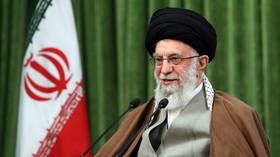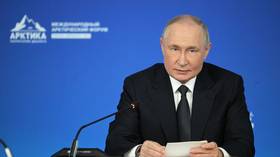Here's why talks with Iran are no guarantee against war
Another round of talks between Iran and world powers has begun in Vienna. While the aim is to revive the 2015 nuclear deal, the process seems to be dragging both sides closer to war than to a diplomatic settlement.
Joe Biden had pledged during his presidential campaign in 2020 to re-enter the Obama-era Joint Comprehensive Plan of Action (JCPOA). Yet, since he came into office, his administration has pursued exactly the same policy as his predecessor, Donald Trump, who unilaterally withdrew from the deal in 2018 and launched a “maximum pressure” sanctions campaign to force Iran into renegotiating it.
For the Iranians, who are now participating in indirect talks with the Americans, their only stated goal is to have the sanctions revoked. In return, Iran would then agree to comply again with the deal. But things aren’t that simple, given the United States began threatening both a diplomatic and military escalation prior to the talks even taking place. The head of the US Central Command (CENTCOM), General Kenneth McKenzie, told Time magazine last Wednesday that military options have been prepared in the event the current round of talks fail. Last Thursday, the Biden administration also threatened to confront Iran over its non-compliance with the International Atomic Energy Agency’s request to re-install cameras at Iran’s TESA Karaj complex, which was damaged by an act of sabotage in June that Tehran blamed on Tel Aviv.
As the US continues to pressurise Iran into accepting new conditions for a renegotiated deal, so the Islamic Republic continues to enrich its uranium to an estimated 63% purity. It now claims to have a 55lb (25kg) stockpile. A new deal, which is favoured by Biden’s allies in Israel, would entail an agreement under which Iran would limit its missile programs and end support for its regional allies, from Yemen to Lebanon.
Israel continues to fearmonger over Iran’s alleged pursuit of a nuclear weapon, placing pressure on the Biden administration and threatening military action against Tehran. It revealed in October that it was training for a strike on Iranian nuclear facilities. Israeli Prime Minister Naftali Bennett accused Iran of “nuclear blackmail” on Monday, and urged world powers not to re-enter the JCPOA. “Iran will be arriving at negotiations in Vienna with a clear goal: to end sanctions in exchange for almost nothing,” he said.
Contradicting claims made earlier in January by Israel’s military chief, Aviv Kochavi, that Iran could have nuclear weapons in “months, maybe even weeks”, Finance Minister Avidgor Lieberman claimed, “Iran will be a nuclear state and have a nuclear weapon within five years, tops.” As embarrassing as those contradictory predictions by the Israeli government are, this is no new feat, as they have been made for almost 30 years, with former president Shimon Peres fearmongering in 1992 that Iran would be “armed with a nuclear bomb by 1999”. The most off-course predictor of a single event in modern history, however, has to be former prime minister Benjamin Netanyahu, who claimed the same year that Tehran was“three to five” years away from producing an atomic weapon. He has continued, over the best part of three decades, to make similar predictions, all of which have been proven wrong.
Somehow, nonetheless, these claims still seem to hold weight and, bafflingly, the US government is taking them very seriously indeed. The UK also seems to be very serious about Israel’s predictions, with Israeli Foreign Minister Yair Lapid and British Foreign Secretary Liz Truss, meeting against the backdrop of the Vienna talks, agreeing on a 10-year plan for strengthening national ties. Part of this plan, which was agreed by Israeli officials and their British counterparts, was joint cooperation to stop Iran from developing nuclear weapons “at all costs”.
The Biden administration, as well as spouting rhetoric about the dangers of a nuclear Iran, has been publicly discussing military options and hitting Tehran with even more sanctions. In October, Washington announced fresh curbs on two Iranian companies and two members of the Islamic Revolutionary Guards Corps. “If diplomacy fails, we’re ready to turn to other options,” Biden said in August, and, now, with more clarity being added from CENTCOM, it’s understood a strike is being weighed up.
Another dangerous development came in October, when drones and projectiles struck an American military outpost in al-Tanf, Syria, to which the US vowed a response. Initial reporting led the public to believe that “Iran-backed militias” were behind the attack, but a report issued later by the New York Times quoted “unnamed [US] officials” as having said the Biden administration believed Iran directed the attack. If the US launches retaliatory strikes, the likes of which were carried out in Syria and Iraq earlier this year, without Congressional approval, this could cause a significant stir regionally. If Iranians or Iran itself are targeted, that could elicit a response from Tehran.
There is no proof of any secretive Iranian nuclear weapons program. The real goal for Washington and Tel Aviv is to pressurise Tehran into making concessions on its regional alliances and weapons program. In reaction to the Israeli assassination last November of Iran’s top nuclear scientist, Mohsen Fakhrizadeh, as well as Israel’s countless acts of sabotage against Iranian nuclear facilities, Iran has only adopted a more aggressive pursuit of uranium enrichment. Similarly, the Biden administration’s hardline approach has only encouraged Iran to take escalatory measures in spite of American aggression. These have included close-quarters naval maneuvers designed to show Washington its willingness to confront escalatory moves.
The danger of an exchange of blows between the Islamic Republic and Western forces is ever increasing, and if the talks in Vienna don’t bear fruit, it doesn’t seem as if Biden has any other strategy to revive the Iran nuclear deal than to use military might and sanctions to bully Tehran. Iran clearly wants to re-enter the deal in order to have the sanctions lifted, but wants to be part of the one struck with the Obama administration, not an Israeli-US effort to undermine its regional power. A lifting of the US’s hardline sanctions is being sought desperately by the Iranian public, who suffer the brunt of Washington’s aggression. But the Iranian government views its weapons programs and alliances as separate issues and wishes for the US to stop its sanctions war regardless, as it was Washington that took the decision to exit the deal, not Tehran.
The most honest course of action would be for the West to drop its claims that its approach to the JCPOA is based on Iran’s alleged pursuit of nuclear weapons and, instead, admit it has an entirely different agenda. Its claims that it’s concerned Iran is developing a weapon of mass destruction wore thin long ago.
The statements, views and opinions expressed in this column are solely those of the author and do not necessarily represent those of RT.
















